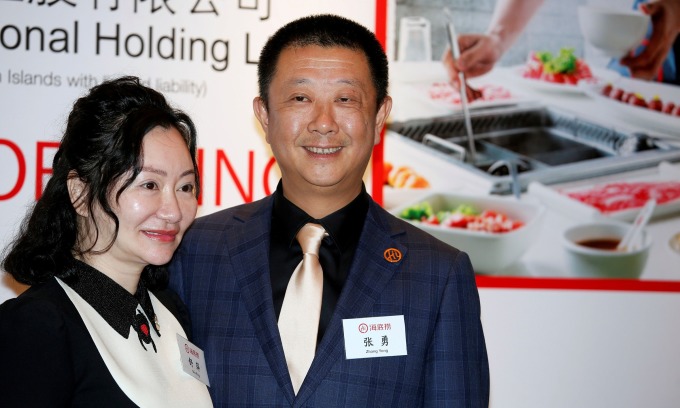How billionaire couple behind Haidilao hotpot chain became one of Singapore’s richest
The chain, whose name means “scooping the bottom of the ocean,” is one of the most popular Chinese cuisine brands in the world with 1,374 outlets in China and overseas as of the end of 2023. Its revenue for the year was 41.5 billion yuan (US$5.7 billion).
Its success propelled all four co-founders into billionaire status, with Zhang and his wife, Shu Ping, both naturalized Singapore citizens, securing the 10th spot on Forbes‘ 2024 ranking of the 50 wealthiest tycoons in the city-state.
The two other co-founders, Shi Yonghong and Li Haiyan, currently have net worths of $2.2 billion and $1.6 billion, respectively.
Zhang Yong (right) and his wife Shu Ping, co-founders of the hotpot chain Haidilao, pose before an investors’ luncheon ahead of the company’s IPO in Hong Kong, China, on Sept. 10, 2018. Photo by Reuters |
But the hotpot giant today traces its roots back to 1994, when it was a small restaurant with just four tables in Sichuan province, China, according to the South China Morning Post.
Zhang, who hails from Sichuan’s Jianyang city, dropped out of high school to work at a tractor factory for several years before venturing into business.
He started Haidilao in Jianyang with a total investment of less than 10,000 yuan, which was mostly funded by the other co-founders, including Shu, who was his girlfriend at the time.
“Though I didn’t contribute much in terms of start-up money, I assumed the position of general manager and promised the others that our assets would grow to 150,000 yuan within five years,” Zhang told Chinese newspaper The Economic Observer in a 2011 interview.
“I swore that if I couldn’t manage it, I would compensate them. That was a huge amount of money for a group of twenty-somethings in the 1990s, so they were all a bit startled.”
He later admitted that he did not even know how to prepare a traditional Sichuan hotpot when he first started.
Haidilao expanded rapidly, with Zhang and his partners establishing separate businesses to manage warehousing, food ingredient supply, human resources, and renovation and security services for the chain and other restaurants, as reported by Forbes. New locations were able to break even within one to three months.
The brand built its reputation on offering exceptional and innovative services that encourage customer loyalty. Examples include free manicures for waiting diners, photo booths for instant pictures, freshly hand-pulled noodles prepared at the tables, mobile phone chargers, and even baby cots for young children.
Zhang attributes part of Haidilao’s success to his employees, including wait staff, who introduced popular initiatives, such as offering plastic bags to protect customers’ phones and hair ties for long-haired patrons, which have been implemented across the chain’s locations, CNBC reported.
“If you doubt them, then you will fail. You have to give them room to perform, then they will treat their job seriously,” he said. “Putting faith in my staff has paid off for me.”
He also credits the financial incentives given to Haidilao managers, which drive them to consistently surpass expectations. They reportedly get a 3% share of their restaurant’s profits.
Haidilao went public on the Hong Kong Stock Exchange in 2018, raising nearly $1 billion through its initial public offering, which valued the company at around $12 billion. This milestone made Zhang the wealthiest restaurant entrepreneur globally at the time.
 |
Zhang Yong, founder of Haidilao International Holding, poses during the ceremony for the listing of Chinese hotpot chain Haidilao at the Hong Kong Stock Exchange in Hong Kong, China, on Sept. 26, 2018. Photo by AFP |
Zhang and his wife, who became Singapore citizens prior to the IPO, topped the city-state’s rich list for two consecutive years in 2019 and 2020.
However, their combined net worth fell in late 2021 as Haidilao’s shares plummeted on news of the company’s disappointing performance.
The chain later announced plans to close or suspend 300 underperforming stores and reported a loss of 4.16 billion yuan for that year, its first since going public, amid the Covid-19 pandemic.
It said the closures were due to factors such as poor store location choices, a shortage of capable restaurant managers, and an excessive focus on meeting KPIs at the expense of nurturing company culture, according to Singaporean news site Mothership.
Zhang resigned as the chain’s CEO in 2022 when the company was restructuring and trimming its restaurant network. He continues to serve as its chairman and executive director. Nonetheless, the business bounced back that year with a 1.37 billion yuan profit.
In its 2023 annual report, Zhang stated that Haidilao has made notable progress in both the quality of its restaurant service and operational performance.
Last year, the chain announced plans to expand in the U.S. as a response to declining consumption in China, Bloomberg reported.
On doing business, Zhang said a person’s worldview influences their attitude toward money and relationships with colleagues.
“If you’re only interested in earning money, you’re scared of risks and you break your principles as soon as quarrels break out,” he said.
“If you have a bigger dream, you view money as a resource for investment. That is how entrepreneurs think.”


Comments are closed.